Increase in single-use plastics during the pandemic harms the environment
November 10, 2020
The rise of single-use plastics and other waste used for safety and protection during the pandemic can leave a lasting, negative mark on our environment.
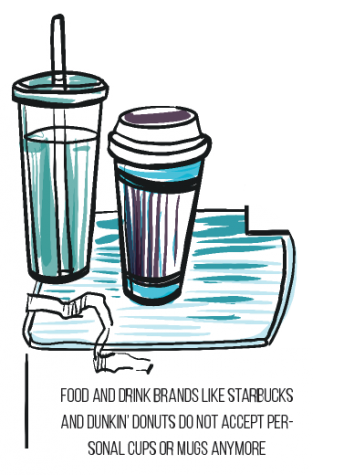
Supermarkets and convenience stores have transitioned to single-use packaging and bags in order to decrease the risk of spreading COVID-19. Large corporations like Target and Whole Foods no longer allow customers to bring their own reusable bags, and food and drink brands like Starbucks and Dunkin’ Donuts do not accept personal cups or mugs anymore.
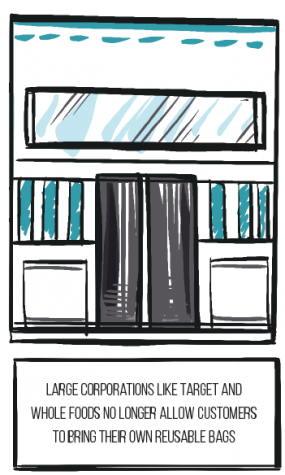
“COVID-19 made a huge impact [on the environment]. A lot of stores and farmers’ markets have forbidden the use of reusable bags for loading up your produce, so they have forced the emergence of single use plastic bags,” said upper school biology teacher Kate Schafer.
Additionally, the Center for Disease Prevention and Control (CDC) advises that restaurants planning to reopen should consider switching to plastic utensils and plates and individually-packaged condiments.
Since the start of the pandemic, multiple states and cities have delayed or paused their restrictions on single-use plastics. San Francisco, which banned disposable plastic bags in 2007, temporarily lifted the ban to protect customers and retailers. Other states have taken similar action, with Maine and New York postponing their bans on single-use plastics and Oregon and Massachusetts removing restrictions.
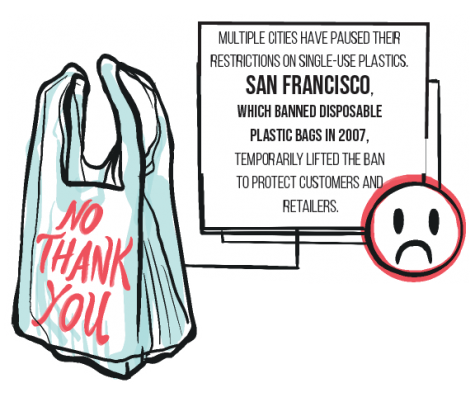
A study published in August for the Elsevier Public Health Emergency Collection predicts that the plastic demand for packaging will increase by 40% and plastic demand in other areas will increase by 17% due to the pandemic.
Furthermore, the loss of waste management companies means that recycled plastic cannot be treated correctly. US cities have restricted recycling streams, so single-use plastics are mixed with solid waste.
Our planet and our ecosystem are extremely sensitive to plastic, and this new surge may be difficult to recover from.
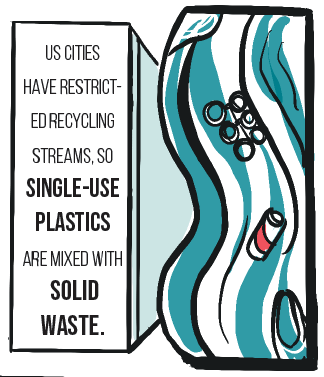
“Big chunks of plastic are obviously terrible, and there’s been a ton of research done on how plastic impacts seabirds and how when microplastics get into the tissues of organisms, they don’t function the way that they should,” said Dr. Schafer. “There have been many papers on the effects, especially on aquatic ecosystems. And many species, especially seabirds, mistake plastic for food and then it gets stuck in their stomachs and they starve.”
Although climate change activist Radha Mehta (10) agrees that plastic is more “necessary in these times,” she believes that there are still ways to protect our environment.
“There are simple things everyone can do. Every time you see some kind of plastic packaging, just find out if there’s an alternative where you don’t need plastic. There are a lot of zero waste stores online that you can look at, too,” said Radha.


















![“[Building nerf blasters] became this outlet of creativity for me that hasn't been matched by anything else. The process [of] making a build complete to your desire is such a painstakingly difficult process, but I've had to learn from [the skills needed from] soldering to proper painting. There's so many different options for everything, if you think about it, it exists. The best part is [that] if it doesn't exist, you can build it yourself," Ishaan Parate said.](https://harkeraquila.com/wp-content/uploads/2022/08/DSC_8149-900x604.jpg)




![“When I came into high school, I was ready to be a follower. But DECA was a game changer for me. It helped me overcome my fear of public speaking, and it's played such a major role in who I've become today. To be able to successfully lead a chapter of 150 students, an officer team and be one of the upperclassmen I once really admired is something I'm [really] proud of,” Anvitha Tummala ('21) said.](https://harkeraquila.com/wp-content/uploads/2021/07/Screen-Shot-2021-07-25-at-9.50.05-AM-900x594.png)







![“I think getting up in the morning and having a sense of purpose [is exciting]. I think without a certain amount of drive, life is kind of obsolete and mundane, and I think having that every single day is what makes each day unique and kind of makes life exciting,” Neymika Jain (12) said.](https://harkeraquila.com/wp-content/uploads/2017/06/Screen-Shot-2017-06-03-at-4.54.16-PM.png)








![“My slogan is ‘slow feet, don’t eat, and I’m hungry.’ You need to run fast to get where you are–you aren't going to get those championships if you aren't fast,” Angel Cervantes (12) said. “I want to do well in school on my tests and in track and win championships for my team. I live by that, [and] I can do that anywhere: in the classroom or on the field.”](https://harkeraquila.com/wp-content/uploads/2018/06/DSC5146-900x601.jpg)
![“[Volleyball has] taught me how to fall correctly, and another thing it taught is that you don’t have to be the best at something to be good at it. If you just hit the ball in a smart way, then it still scores points and you’re good at it. You could be a background player and still make a much bigger impact on the team than you would think,” Anya Gert (’20) said.](https://harkeraquila.com/wp-content/uploads/2020/06/AnnaGert_JinTuan_HoHPhotoEdited-600x900.jpeg)

![“I'm not nearly there yet, but [my confidence has] definitely been getting better since I was pretty shy and timid coming into Harker my freshman year. I know that there's a lot of people that are really confident in what they do, and I really admire them. Everyone's so driven and that has really pushed me to kind of try to find my own place in high school and be more confident,” Alyssa Huang (’20) said.](https://harkeraquila.com/wp-content/uploads/2020/06/AlyssaHuang_EmilyChen_HoHPhoto-900x749.jpeg)



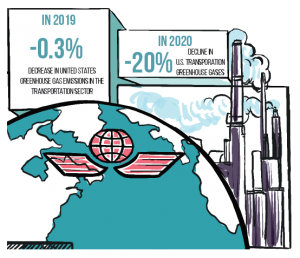
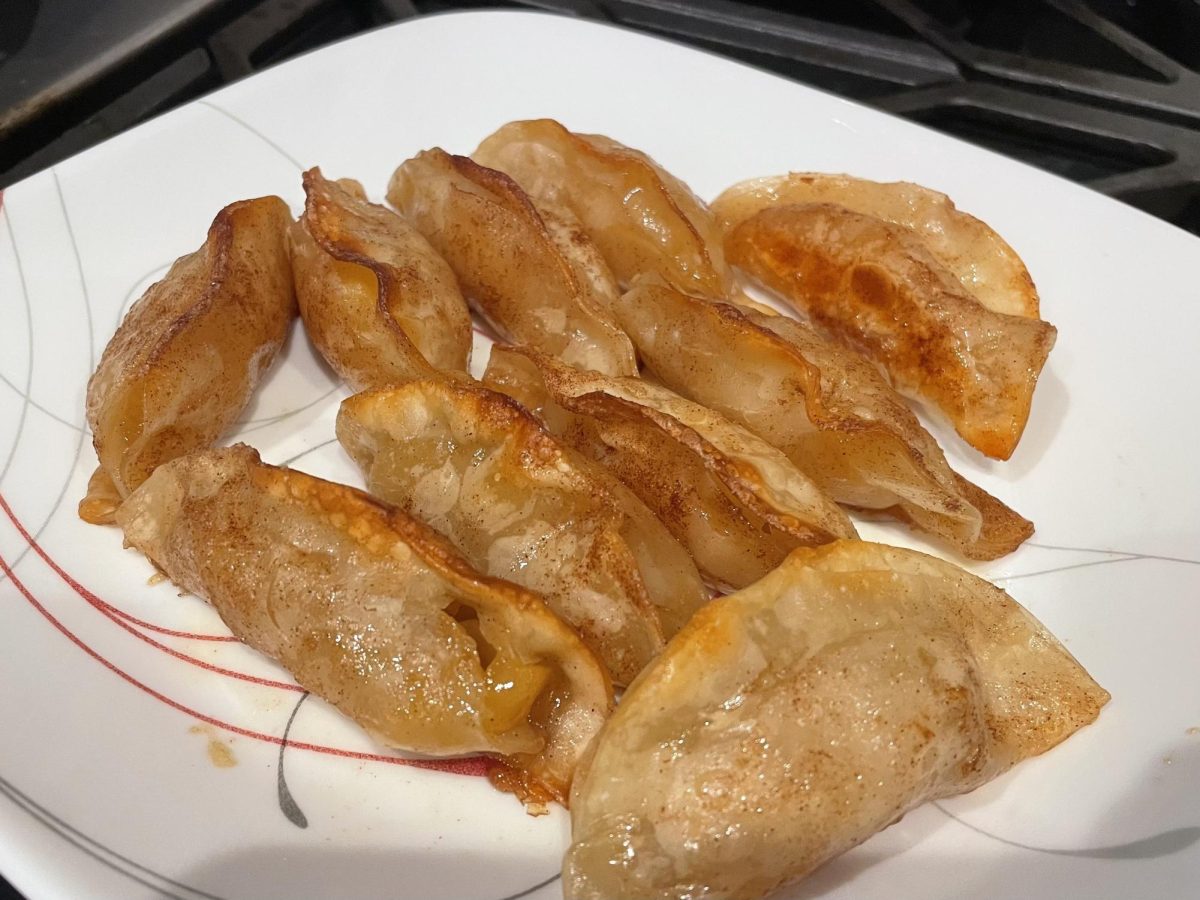





alan • Dec 11, 2023 at 5:48 am
well written, without the hyperbole, and listing some of the positive changes in corporate concern. thanks